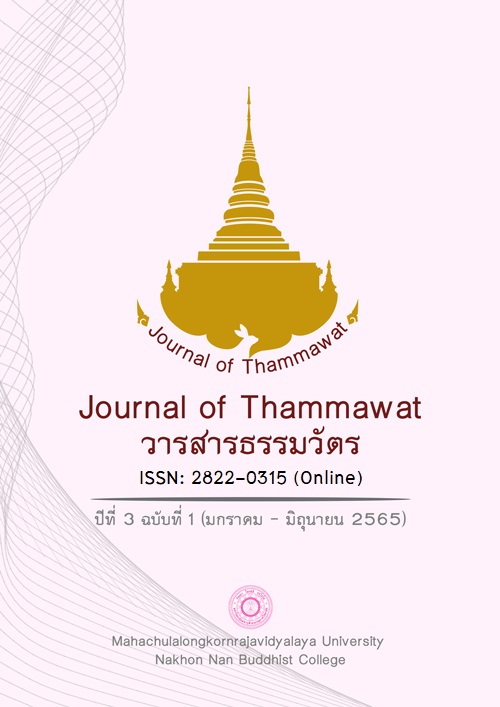The Application of Iddhipãda IV for Successful Organization Administration
Main Article Content
Abstract
The application of Iddhipãda IV for successful organization management that the administrators of the organization should behave according to Iddhipãda IV, namely 1) Chanda: which is satisfied with that love, the administrators must always love their works in order to have the mind to concentrate on their works to be successful. The administrators must do good, correct, honest, fair things and work hard to achieve success, 2) Viriya: which is work hard that thing, the administrators must be diligent, work with effort, strength, patience, discouragement, determine to do good deeds, perseverance and seek for knowledge in order to manage the work that they are responsible for better, 3) Citta: which is concentration that thing, the administrators must pay attention to their works, concentrate on the mind without letting the mind distract, enthusiastic by working with energy, work carefully, wisely, reasonably that is appropriate to prevent the mistakenness in the organization administration, and 4) Vimamsã: which is persistence in considering the reasons that thing, the administrators are diligent, consider, contemplate, examine, finding reasons and always checking for shortcoming, planning for ways to improve work, applying wisdom to ponder what is wrong, correct by adhering the principles of morality and ethics in their own profession ethics that should not be tainted.
Article Details

This work is licensed under a Creative Commons Attribution-NonCommercial-NoDerivatives 4.0 International License.
References
ติน ปรัชญพฤทธิ์. (2527). ทฤษฏีองค์การ. กรุงเทพฯ: ไทยวัฒนาพานิช.
ธงชัย สันติวงษ์. (2539). องค์การและการบริหาร. พิมพ์ครั้งที่ 10. กรุงเทพฯ: ไทยพัฒนาพานิช.
บรรจบ เนียมมณี. (2523). หลักการบริหาร. กรุงเทพฯ: มหาวิทยาลัยศรีนครินทรวิโรฒ,
ประทาน คงฤทธิ์ศึกษากร. (2530). สุขาภิบาลในฐานะหน่วยการปกครองตนเอง. วารสารพัฒนาบริหารศาสตร์. 27(3), 342.
พระพรหมคุณาภรณ์ (ป.อ.ปยุตโต). (2549). พุทธธรรม ฉบับปรับปรุง และขยายความ. (พิมพ์ครั้งที่ 11). กรุงเทพฯ: โรงพิมพ์บริษัท สหธรรมิก จำกัด.
พุทธทาสภิกขุ. (2537). การทำงานที่เป็นสุข. กรุงเทพฯ: ธรรมสภา.
มหาจุฬาลงกรณราชวิทยาลัย. (2539). พระไตรปิฎกภาษาไทย ฉบับมหาจุฬาลงกรณราชวิทยาลัย. กรุงเทพฯ: โรงพิมพ์มหาจุฬาลงกรณราชวิทยาลัย.
ราชบัณฑิตยสถาน. (2546). พจนานุกรมศัพท์ศาสนาสากล. กรุงเทพฯ: บริษัท นานมีบุ๊คส์พลับลิเคชั่นส์ จำกัด.
วิชัย ตันศิริ. (2549). อุดมการณ์ทางการศึกษา: ทฤษฎีและภาคปฏิบัติ. กรุงเทพฯ: จุฬาลงกรณ์มหาวิทยาลัย.
สมพร เฟื่องจันทร์. (2547). แนวคิดและหลักการจัดการองค์การสาธารณะ. กรุงเทพฯ: สำนักพิมพ์ จุฬาลงกรณ์มหาวิทยาลัย.
สัญญา สัญญาวิวัฒน์. (2550). การบริหารจัดการแนวพุทธ. กรุงเทพฯ: ศูนย์หนังสือแห่งจุฬาลงกรณ์มหาวิทยาลัย.
Dale Yoder. (1965). Personnel Principles and Policies. (fourth printing). Englewood Cliffs: New Jersey Prentice-Hall.
Don Hellriegel. (1982). Management. (third edition). Addison-Wesley: Publishing Company.
E.N. Chapman. (1995). Supervisor Survival Kit. (second edition). California: Science Research Associates.


